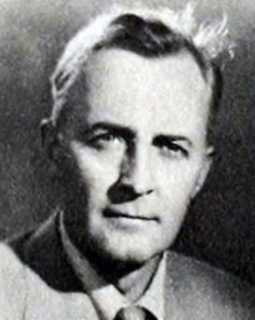A Quote by Max Planck
Science does not mean an idle resting upon a body of certain knowledge; it means unresting endeavor and continually progressing development toward an end which the poetic intuition may apprehend, but which the intellect can never fully grasp.
Related Quotes
There's another way to edit the sentence, which is to add a comma before the second 'which.' The survivor is struggling toward 'some resolution,' not a specific resolution that the mind may never find. The final clause is an appended thought, not a conclusion of the previous clause: 'Death ends a life, but it does not end a relationship, which struggles on in the survivor's mind toward some resolution, which it may never find.'
There is a power in the soul, quite separate from the intellect, which sweeps away or recognizes the marvelous, by which God is felt. Faith stands serenely far above the reach of the atheism of science. It does not rest on the wonderful, but on the eternal wisdom and goodness of God. The revelation of the Son was to proclaim a Father, not a mystery. No science can sweep away the everlasting love which the heart feels, and which the intellect does not even pretend to judge or recognize.
But the knowledge and love of our Divine Redeemer, of which we were the object from the first moment of His Incarnation, exceed all that the human intellect can hope to grasp. For hardly was He conceived in the womb of the Mother of God, when He began to enjoy the Beatific Vision, and in that vision all the members of His Mystical Body were continually and unceasingly present to Him, and He embraced them with His redeeming love
I think that we shall have to get accustomed to the idea that we must not look upon science as a 'body of knowledge,' but rather as a system of hypotheses; that is to say, as a system of guesses or anticipations which in principle cannot be justified, but with which we work as long as they stand up to tests, and of which we are never justified in saying that we know they are 'true' or 'more or less certain' or even 'probable.'
What does cookery mean? It means the knowledge of Medea and of Circe,
and of Calypso, and Sheba. It means knowledge of all herbs, and fruits, and
balms and spices... It means the economy of your great-grandmother and the
science of modern chemistry, and French art, and Arabian hospitality. It
means, in fine, that you are to see imperatively that everyone has something
nice to eat.
In real science a hypothesis can never be proved true...A science which confines itself to correlating phenomena can never learn anything about the reality underlying the phenomena, while a science which goes further than this and introduces hypotheses about reality, can never acquire certain knowledge of a positive kind about reality; in whatever way we proceed, this is forever denied us.
Hope is easy; knowledge is hard. Science is the one domain in which we human beings make a truly heroic effort to counter our innate biases and wishful thinking. Science is the one endeavor in which we have developed a refined methodology for separating what a person hopes is true from what he has good reason to believe.
I am fully assured, that no general method for the solution of questions in the theory of probabilities can be established which does not explicitly recognize, not only the special numerical bases of the science, but also those universal laws of thought which are the basis of all reasoning, and which, whatever they may be as to their essence, are at least mathematical as to their form.
The process of inner self-examination brings about a knowledge that is as rigorous and supported by evidence as anything science has to offer. At the same time, this point of view redefines faith as a knowledge that is attained not only by intellectual means, but also through the rigorous development of the emotional side of the human psyche. Such emotional knowledge is unknown to the isolated intellect and has therefore been mistakenly labeled as "irrational."
Know that for the human mind there are certain objects of perception which are within the scope of its nature and capacity; on the other hand, there are, amongst things which actually exist, certain objects which the mind can in no way and by no means grasp: the gates of perception are closed against it.




































